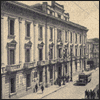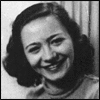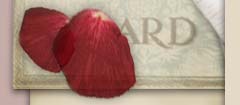Home > War Bride Stories > Anna (Perugini) Lavigne > Page 2
 |
| Click image for larger view. Canadian soldiers in Italy. |
 |
| Click image for larger view. Avellino street scene. |
 |
| Click image for larger view. Anna as a young woman. Photo courtesy of Anna and Aurele Lavigne. |
It was a Tuesday morning," Anna recalls. "I'll never forget it...it was a beautiful day. We saw these planes coming, there were about 60 of them. You could just hear the noise. We were looking around and of course everyone was yelling. Nicolo, my brother-in-law, was at work. Julia, my other sister, she was also at work. My sister Amelia just got down on her knees and prayed."
Fortunately, the Perugini family was spared that day and in the following two weeks as the aerial bombardment continued unabated, but many of their friends and neighbours were not so lucky.
On the final day of the German occupation of the area, soldiers went through the village and killed all the animals, including mules, cows and sheep. This was a scare tactic that thoroughly demoralized the villagers, who were already suffering depravations brought on by the war.
By early October 1943, the Americans arrived in the mountain village, taking the family completely by surprise. Anna recalls how they woke up one morning to find Americans camped out in their front yard.
"We woke up in the morning, we opened the window and there were so many of them they were like ants: American troops had arrived during the night."
Anna recalls everyone in the village was so happy that, "We all got out of the home and we yelled and we banged pots into the street. The Americans gave us Lifesavers, a bar of soap...cornbeef", things that were unavailable during war time and were like gold to the hungry Italians.
With the arrival of the Americans, life began to return to normal. There was no longer any fear that enemy soldiers would walk into your house and threaten to kill you, and although the continued fighting in the rest of Italy meant that rationing was still in effect, life became more peaceful.
The Americans allowed the Peruginis to go to their apartment in Avellino to retrieve what personal effects were left after the bombing and fighting in the city. "We had to have permission, because there was such a smell of dead bodies and everything was ruined," Anna says. When the family went to the apartment, they found that there was hardly anything left.
Given that their home was unsuitable for living, Anna and the rest of her family moved to an apartment in Mercogliano, not far from Avellino. It was during this period that the Canadians came to Avellino and as fate would have it, Anna met her husband Aurele.
Avellino was the headquarters for the Canadian troops in Italy. Few Canadians spoke Italian, so a call went out for English/Italian interpreters. Even though Anna had been taking English at the University of Naples before the war, she wasn't functionally bilingual, but her sister Teresa was.
Teresa was an English teacher and soon she was approached to be an interpreter at the Canadian headquarters in Avellino. Teresa refused: "She was scared," Anna says, not of the Canadians per say, but at the thought of being around so many foreigners. Anna explains: "At that time, it was a different way of looking at things. We were brought up in a close family." It was through Teresa's contact with Canadian Army personnel, who were trying to persuade her to take on a job as interpreter, that Anna met Staff Sergeant Aurele Lavigne, of Bathurst, New Brunswick...Next
Back to Top
|
 |






